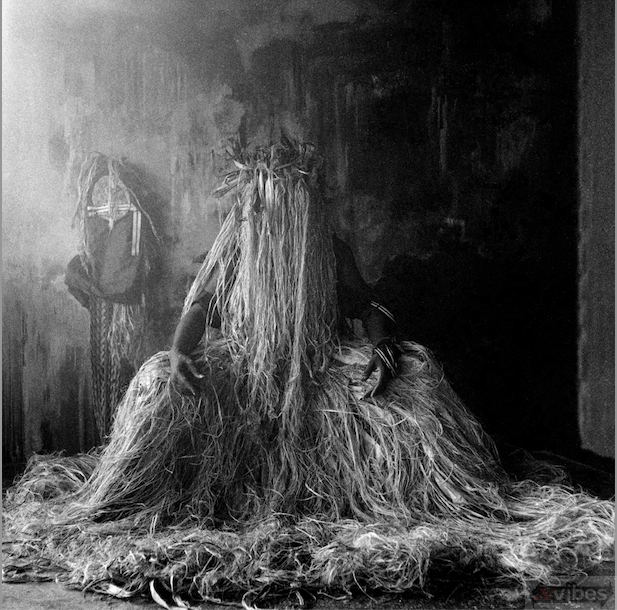
Vulgar Fraction, the independent mas band from Belmont brought out by designer Robert Young, will explore the Kongo this Carnival to highlight the often underappreciated but significant Central African cultural influence in the Caribbean.
In its Carnival band titled “Kongo Dey” (meaning “The Kongo is there”) and a series of talks and events, it will celebrate the Kongo presence and resilience in the Caribbean.
The Democratic Republic of the Congo (DRC), one of the largest countries in the Central African region, is in the news as conflict over the country’s extraction and export of so-called “3TG minerals” (tin, tungsten, tantalum and gold) continues between the Kinshasa government and armed rebels. The 3TG raw materials are essential to the manufacture of modern consumer electronics such as smartphones and tablets, inextricably tying these products to the bloody atrocities committed by those attempting to control their extraction and often illegal export. Cobalt, a mineral essential to making lithium-ion batteries, is also extracted from the country’s mines—up to 75 percent of the global supply comes from the DRC.
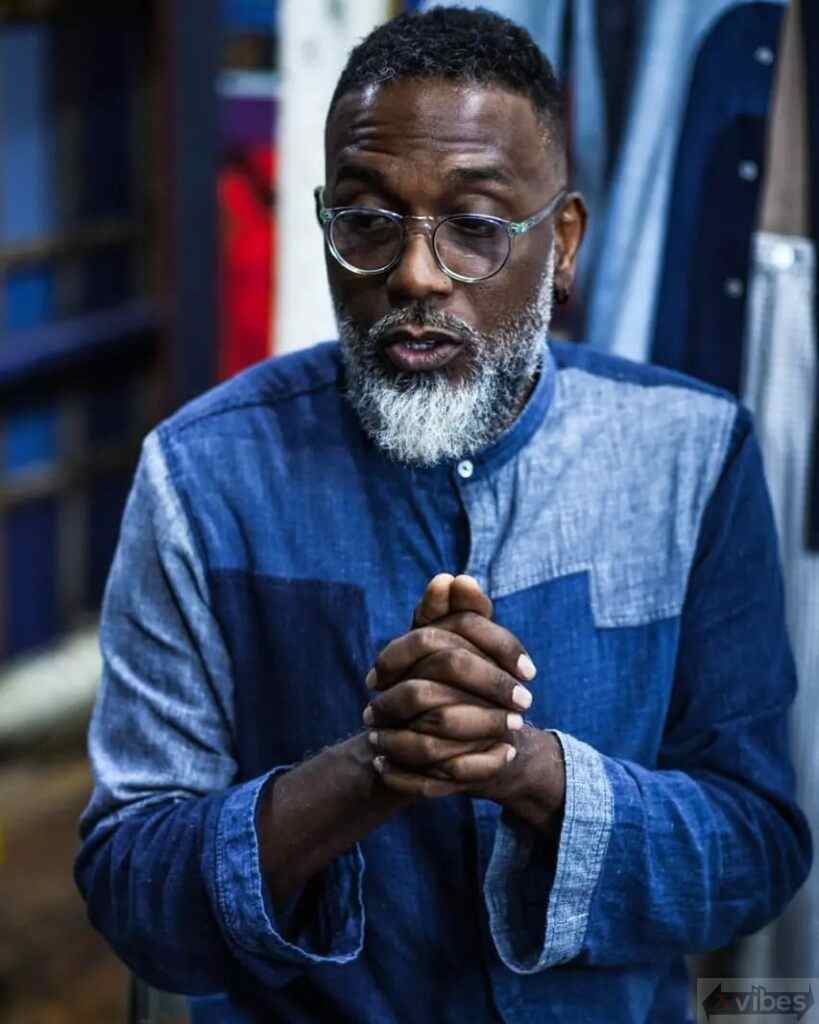
“Kongo is here, in your cell phones, in the batteries of your electric cars,” Young said in a recent interview at his atelier at Propaganda Space, Erthig Road, Belmont.
Congo, or Kongo as it is often styled, is also here because of our history in the plantation economy and African chattel slavery. In another kind of “extraction”, enslaved people from the Central African region were brought to Trinidad and Tobago; they and the cultural retentions that linger in their wake are remembered in TT culture as “Kongo.”
“And this is our way to recognize that ‘Kongo dey’ but it exists in Trinidad; it seems invisible, but it’s here, in ‘Kongo pepper’, in the way we say, ‘One day, one day, Kongo tey.’” The long-time phrase harks to the Kongo spiritual philosophy that there is a natural order to things, a cycle of death and rebirth, a pendulum that will swing back over time to restore balance and order.
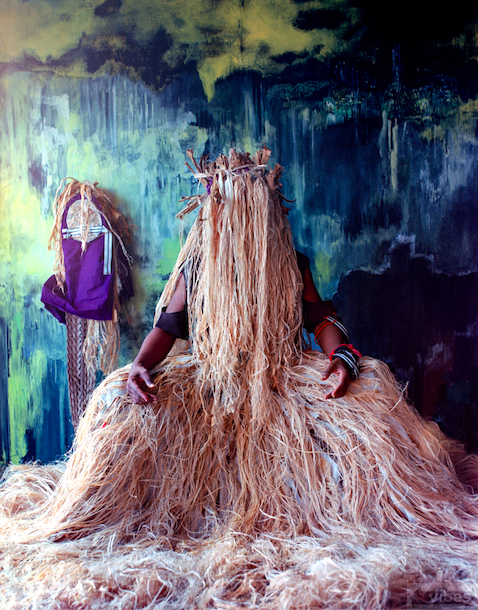
Some of the ideas that Young hopes to speak to in a series of talks on February 5, 13, 14 and 26 are historical Kongo influences in Caribbean culture, religious and spiritual practices, artistic traditions and cultural resilience, and contemporary interpretations of Kongo heritage. These include stick-fighting and some Spiritual Baptist practices and beliefs. One session will be held online and the others at the Vulgar Fraction band headquarters.
The speakers will include Maureen Warner-Lewis, Professor Emerita of African-Caribbean Language and Orature at UWI, Mona, and other international theorists on African spirituality, language and culture in the Caribbean, such as Prof Dianne Marie Stewart, the Samuel Candler Dobbs Professor of Religion and African American Studies at Emory University, and Rondel Benjamin of the Bois Academy of TT.
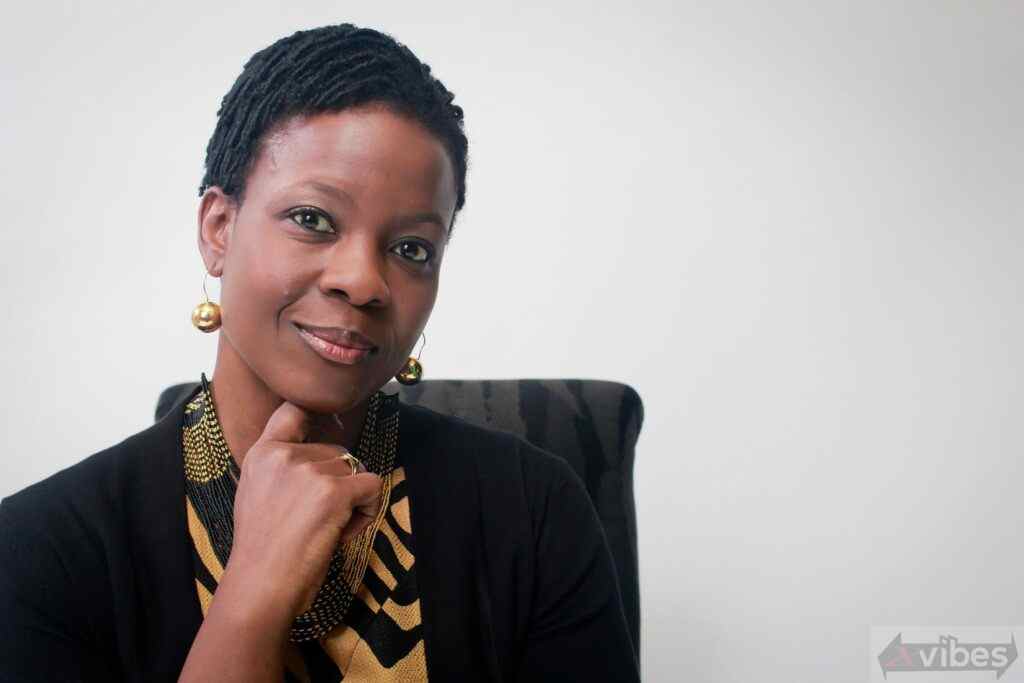
On Carnival Monday and Tuesday, the king of the band will be Adrian Young as Daddy Jumbie; he will also lead the procession that culminates the band’s launch on February 13 on Erthig Road.
Vulgar Fraction is an independent mas band that challenges conventional Carnival approaches. The band is known for encouraging masqueraders to create their own costumes, using traditional mas elements combined with contemporary techniques. Kongo Dey will use 700 banana trees as a main design component. The trees have been processed using a machine loaned to Vulgar Fraction by the UWI University Field Station at Mount Hope and the UWI Engineering Department. The stripped, dried banana plant fibers, tied into long tufts, adorn the costumes as a statement about extraction. Vulgar Fraction operates without corporate sponsorship. This year’s band is being produced with partial support of the Institute for Small Islands, as part of the institute’s work in culture.
Vulgar Fraction is known for its unique, independent approach to Carnival. The band encourages participants to create their own costumes based on a provided theme and framework.
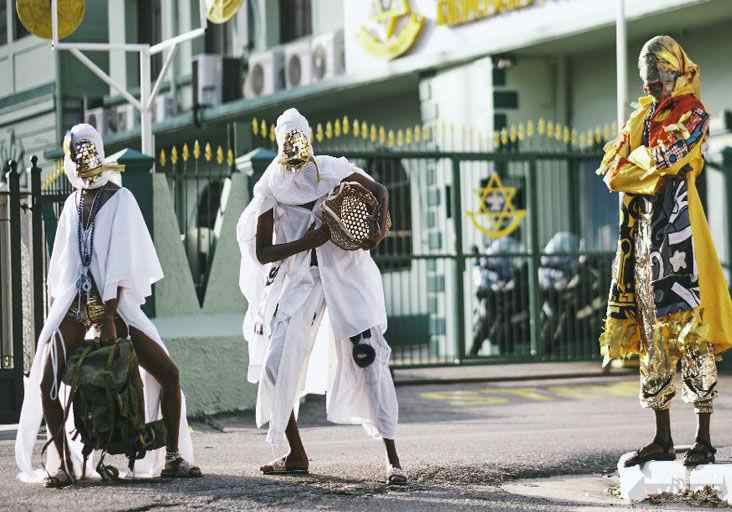
Robert Young describes it as “a truly independent mas” where people “masquerade yourself and play with a very small, loosely held and close-knit group of misfits”. On Carnival Monday, March 3, Vulgar Fraction will invite other small bands to join them on the road from 4-8 pm.
Poet and scholar Christian Campbell, writes, “’Kongo Dey’ is a mas that points— Kongo DEY. Kongo lives there and there and there. But where is there? ‘Dey’ is necessarily ambiguous. When you see Vulgar Fraction, they will be pointing in many directions at once— towards the local and across the sea; to and through the physical world and to the spirit world.
“’Kongo Dey’ suggests that to point to the conflict in contemporary Congo, we must also point to the Kongo within, hiding in plain sight. Dey and dey. It’s a performance that cuts through the erasures of the media. The pun continues. In ‘Kongo Dey,’ I also hear Kongo day. The mas will be a day to acknowledge the living presence of Kongo in Trinbagonian and Caribbean culture. It is veneration, mourning, and protest at once. We shall see Kongo dey and dey and day. In due time.”
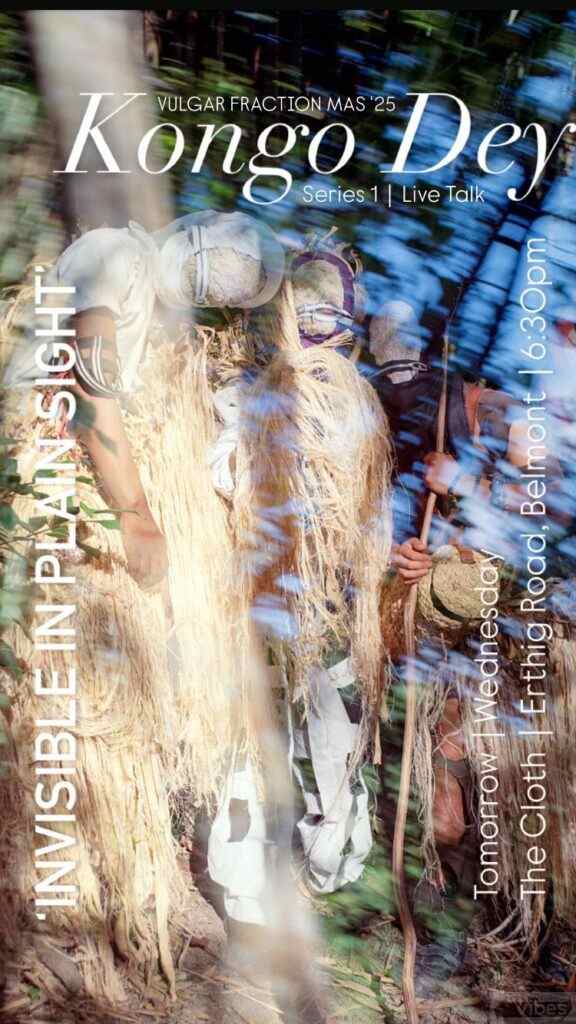
Events
February 5: Kongo Dey Live Talk,
24 Erthig Road, Belmont, 6.30pm.
Entertainment provided by DJ Prizt of the Burg Vintage Store.
Speakers:
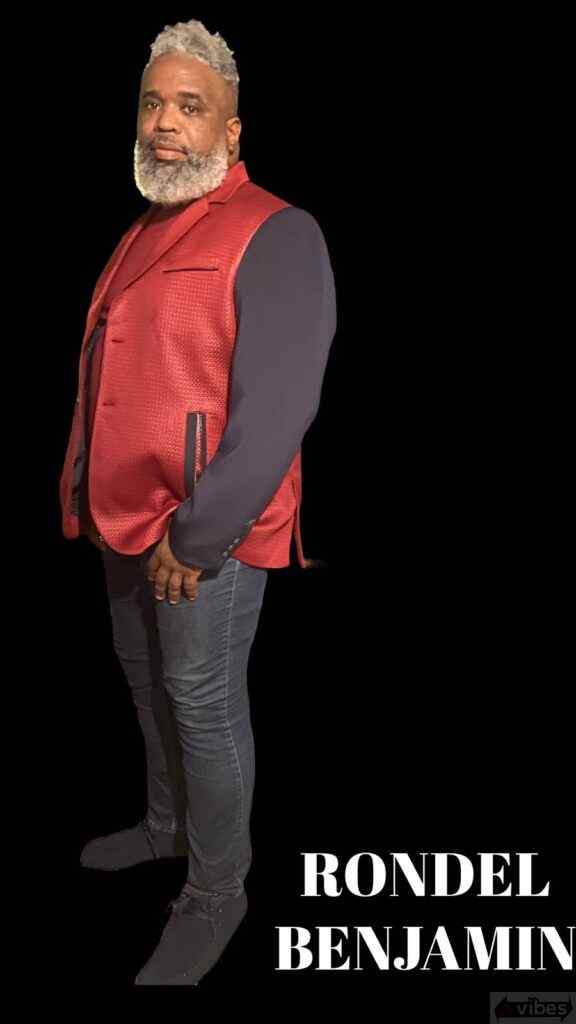
Rondel Benjamin of the Bois Academy of TT. Benjamin is a pioneering force in the revitalization of African-Caribbean martial traditions, particularly the Kalinda suite. He champions gilpin (blade), bois (stick-fighting), and rope jab (whip), carrying forward a lineage of warrior knowledge that bridges past and present. As an organizer and charter member of the African Diaspora Stick and Blade Association, Benjamin’s influence extends across the Caribbean, UK, North America, South America, and Europe. His work with Bois Academy positions Kalinda not only as a combat system but as an innovative framework for cultural restoration, somatic healing, anti-colonial thought, youth education, and social justice. This mission is deeply rooted in the honoring of ancestral and living masters and elders, ensuring that Kalinda remains a living, evolving tradition.
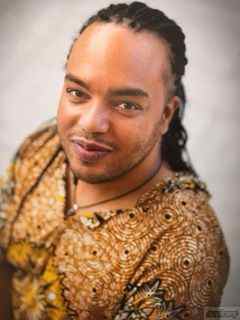
Thomas Talawa Prestø, a pioneer in Africana Performance Studies and foremost specialist in polycentric dance technique. Presto has significantly enriched the field with over 80 novel terminologies and concepts. As the founder of the internationally acclaimed Tabanka Dance Ensemble, Prestø has performed in over 30 countries and developed the trademarked Talawa Technique. This comprehensive dance method, taught worldwide, integrates ancestral movements with contemporary sensibilities. Prestø’s research delves into the ethical considerations of cultural heritage utilization and the impacts of globalization on African cultural expressions.
DJ Prizt, aka Kevon Walker, a versatile DJ with over 15 years of experience. His journey began in New York, where he studied sound engineering and played at various underground venues before returning to Trinidad to run the renowned/iconic club Metropolis on Ariapita Avenue. Over the years, his style has evolved into a rich fusion of house, calypso, reggae, and jazz, making his sets a dynamic and immersive experience. With a background spanning art, fashion, and nightlife, Prizt curates a sound that bridges global influence with Caribbean roots.
February 13: Kongo Dey Band Launch,
24 Erthig Road, Belmont, 6.30pm
Band launching culminates in a procession led by moko jumbie king of the band Adrian “Daddy Jumbie” Young, and Egbe Omo Oni Isese drummers. Includes refreshments, and entertainment by DJ Prizt of the Burg Vintage Store.
Speakers:
Prof Dianne Marie Stewart. Stewart is Samuel Candler Dobbs Professor of Religion and African American Studies at Emory University, specializing in African heritage religious cultures in the Caribbean and the Americas and womanist approaches to religion and society. Stewart is the author of numerous articles/chapters and two academic-facing books, Three Eyes for the Journey: African Dimensions of the Jamaican Religious Experience (Oxford University Press, 2005) and Obeah, Orisa, and Religious Identity in Trinidad, Volume II, Orisa: Africana Nations and the Power of Black Sacred Imagination (Duke University Press, 2022). She spent a year and a half conducting archival and field research as a Fulbright Scholar in the Democratic Republic of Congo, where she focused on the history of religions in Central Africa during the slave period and contemporary prophetic religious movements in Congo. Her current book project, Local and Transnational Legacies of African Christianity in West-Central Africa and the Black Atlantic World, builds upon this research to explore how 18th-century Kongo Catholicism inspired the formation of Afro-Protestant institutions among African descendants in the wider 18th- and 19th-century Atlantic world.
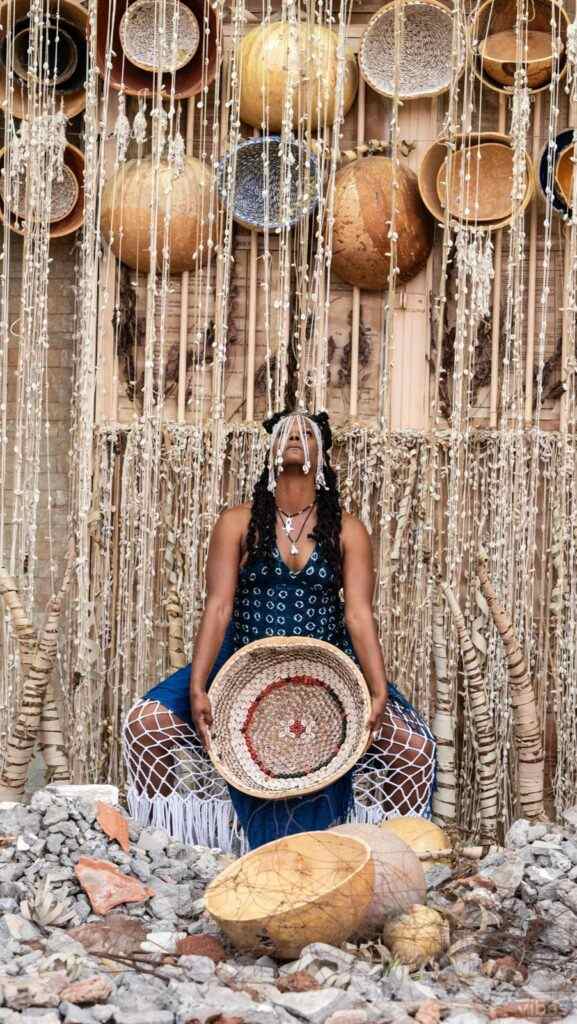
Dr Yanique Hume. Hume is a Senior Lecturer and Head of the Department of Cultural Studies at the University of West Indies, Cave Hill Campus, specializing in Caribbean cultural thought and the religious and performance cultures of the African diaspora. She conducts interdisciplinary research in the humanities and creative arts, utilizing cultural anthropology, cultural studies, comparative religion, performance studies, and critical dance practice. Hume has worked with dance companies across the Caribbean exploring a range of ritual and modern dance idioms. She is also a member of the dance-scholar collective, “Afro-Feminist Performance Routes.” Dr. Hume is the co-editor of Caribbean Cultural Thought: From Plantation Diaspora (2013); Caribbean Popular Culture: Power, Politics and Performance (2016); and Passages and Afterworlds: Anthropological Perspectives on Death in the Caribbean (2018). Her current book project, “Ecstatic Play: Transcending Spirit in the Traditions of the Wake,” engages in a comparative investigation of the aesthetic and performative dimensions of Black Atlantic mortuary customs as it explores the work of play in sustaining black lives.
Dr TJ Desch-Obi is currently a visiting professor at Universidad ICESI’s Centro de Estudios Afrodiaspóricos in Cali, Colombia. He received his doctorate from the University of California, Los Angeles, and is the author of Fighting for Honor: The History of African Martial Art Traditions in the Atlantic World. He specializes in the historical ethnography of pre-colonial Africa and the African Diaspora with a focus upon martial arts, physical culture, religion, sport, historical linguistics, and military history. His current research focuses on the social history of the machete and the Afro-Colombian machete fighting from 1848 to 1960, and twentieth century prison boxing. Desch-Obi is a permanent member of the history department at the City University of New York’s, Baruch College, where he also teaches in the Black and Latino Studies, Latin American and Caribbean departments.
February 14: Introduction to Kamp Kongo, St Lucia (via Zoom)
Join event at this link: https://us04web.zoom.us/j/79988455751
Preview of the Ki Mbambi Kongo Kamp, which takes place at Nicey Farms, St Lucia, March 16-21, 2025. The camp focuses on the purification of Kongo ancestry and traditions.
Speakers:
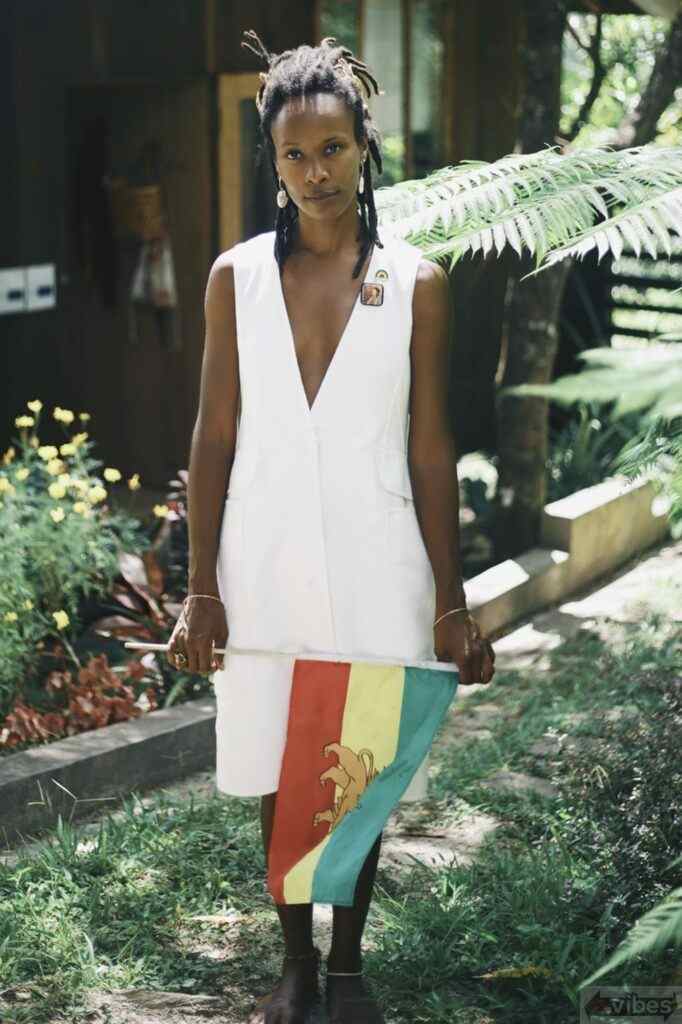
Shala Monroque. Monroque is a cultivator, creative consultant, content developer and curator of talent and ideas in the fashion industry, art community and beyond. Monroque’s early work in New York City includes art advising at The Gagosian Gallery and Editor-at-Large at Pop Magazine. She became Creative Director at Garage Magazine 2011 through 2014 working closely with renowned artists such as Damien Hirst, Richard Prince, and Anna Craycroft. With an eye for fashion and a keen sense of trends, she has served as a consultant with Prada working alongside the creative team on spotting trends and developing concepts like Miu Miu’s Mui Miu Musings. As La Mer’s first World Ocean’s Day Brand Ambassador in 2013, Monroque helped provide much needed funds to support the local St Lucian efforts of Kids for Coral, The Turtle Conservancy and dove with marine biologist Sylvia Earle and National Geographic to raise awareness for ocean conservation. She has contributed to the US editions of Harper’s Bazaar and Vogue, served as Co-Chair for New York Public Library Gala Event for three years until she moved back to her native home. In 2016 Monroque founded Nicey Farms, a regenerative farm residence in St. Lucia. The goal of Nicey Farms is to serve as an off-the-grid destination and respite for global creatives from the worlds of fashion, art and technology to reflect, create and innovate.
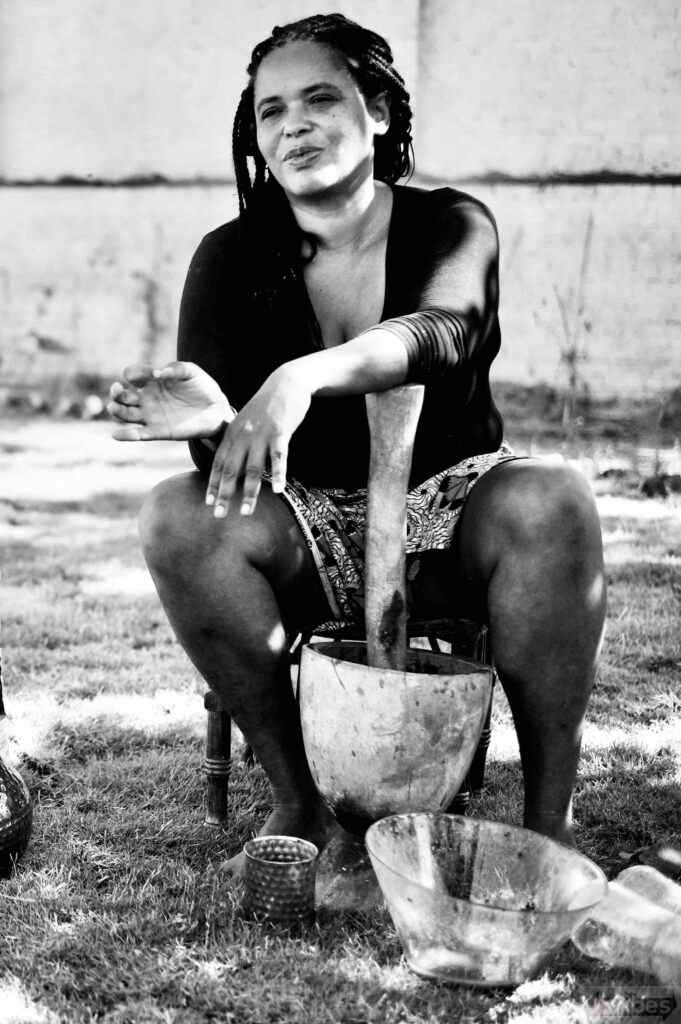
Virginie Pougnand. Pougnand is a Nima, or Kongo Medicine Woman, from The Great Forest of the Bees in Gabon. Born in 1975 in Libreville, her consciousness was reactivated by a mother Nima, an initiatory mother in the sacred cult of Bitwi, mother Etincielle. The Nimas are guardians, Mothers who give birth to the cosmic self. They accompany human beings to become complete in their structures. She is Nima, Nga Gataki, master of the elements. Her mission is to support her own healing and that of her environment.

Dr Chevy Eugene. Recognized as one of the Global Top 100 Most Influential People of African Descent in politics and governance, Dr Chevy Eugene is a cross-pointed Assistant Professor in the Black and African Diaspora Studies Program and the Department of Political Science at Dalhousie University. Eugene’s research takes up the historical struggles for reparations by conceptualizing it as a liberation praxis for conquest, enslavement, colonialism, and neocolonialism in new worldmaking in the Caribbean context. It proposes a decolonial reparations framework that seeks to delink demands for reparations from neoliberal epistemologies and mechanisms that perpetuate the continuation of neocolonial governmentalities in the Caribbean. Additionally, his research explores the role of the arts and social movements in the politicization and mobilization of young people in the Caribbean and its diasporas on the issue of reparatory justice. Dr. Eugene’s current project argues for a decolonial and holistic undertaking of reparations in Canada by connecting the contemporary manifestations of anti-Black systemic racism to transatlantic slavery. He serves as the Caribbean ambassador for the Pan-African Council. This role allows him to lead a collective of entrepreneurs, business leaders, cultural ambassadors, government actors, academics, and activists from the Anglophone, Francophone, Spanish, and Dutch Caribbean to foster political, economic, and social cooperation with Africa.
February 26: Prof Maureen Warner-Lewis and Robert Young in Conversation
24 Erthig Road, Belmont, 6.30pm
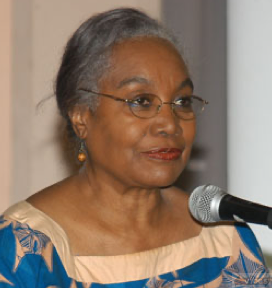
Prof Maureen Warner-Lewis. Born in Tobago and raised in Trinidad, Warner-Lewis is Professor Emerita of African-Caribbean Language and Orature, Department of Literatures in English, UWI, Mona. A pioneer in the study of African language and culture in the Caribbean, she introduced the Oral Tradition and Literature course at Mona in 1985 and has written several definitive texts on the subject of African presence in the Caribbean. These include Central Africa in the Caribbean: Transcending Time, Transforming Cultures (UWI Press, 2003); Trinidad Yoruba – From Mother Tongue to Memory (University of Alabama Press, 1996); and Guinea’s Other Suns – the African Dynamic in Trinidad Culture (The Majority Press, 1991, and UWI Press, 2015).
